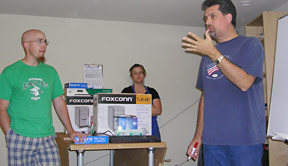Student’s technology skills helped support missions, humanitarian groups
Posted: 9/08/06
| Surrounded by his six-screen computer setup, Wayland senior Jerod Clopton does research for a missionary during his summer missions experience at Greater Good Global Support Services outside Meridian, Texas. |
Student's technology skills helped
support missions, humanitarian groups
By Teresa Young
Wayland Baptist University
PLAINVIEW—The phrase “summer missions” typically conjures images of students sharing the gospel in foreign countries or doing manual labor in inner-city areas, with evangelism the prevalent concern. Jerod Clopton knows first-hand, though, that missions takes on very different shapes and each experience has the power to change lives.
Clopton, a senior math major at Wayland Baptist University and a native of O’Donnell, spent his summer on a farm near Meridian, working for an agency called Greater Good Global Support Services, or G3S2, as an agent of Go Now Missions, an arm of the Baptist General Convention of Texas collegiate ministries.
A nonprofit organization started by the Matt Wallace family, the agency provides technical and logistical support for non-governmental organizations working in foreign areas. Typically, that involves missionaries affiliated with numerous missions-sending agencies and organizations doing humanitarian aid and disaster relief.
 |
| Jerod Clopton, left, listens to his supervisor Matt Wallace explain some cases coming up to the student intern group during a meeting at G3S2. |
“They are about helping people who are living their faith in a cross-cultural environment to be able to serve better,” Clopton said. Though missionaries serving with large organizations like the International Mission Board have the support of such agencies, when problems arise in the field it can be difficult to work their way through the proper channels to find solutions. On the flip side, those self-funded missionaries serving independent of an agency have no support service should problems arise.
As one of seven volunteers serving alongside the Wallaces at G3S2, Clopton said the challenges that came their way took numerous forms and demanded a variety of skills. But the team was taught to approach every situation with three focal points in mind: creativity, responsiveness and empathy.
“Sometimes, you have to be creative in your approach to solving certain problems simply because of the situation, and of course, we had to be there to answer the phones or emails and respond immediately just to let people know we were working on their case,” Clopton said. “It is kind of hard to be empathetic when you are not in a foreign country but you have to put your feet in their shoes and imagine what they’re going through.”
| Wayland Student Summer Missions Report • Skiles confronted world needs on NYC internship • 'Auntie Joy' humbled by summer in Malawi • Jalissa King traded basketball for shopping on Asia missions tour • Student found niche helping renovate Philippine Baptist camp • Student's technology skills helped support missions, humanitarian groups |
Clopton signed up for the assignment because it involved the use of technology and, as a student worker in the Wayland informational technology department, he felt qualified for the task. The actual experience involved not just technology skills but lots of patience, perseverance and thinking on their feet.
Several requests came for help with international travel issues such as missed flights and missing passports. One case, involving a young man who lost his passport in an airport in Spain, took the team three straight days of phone calls, research and networking before God finally provided an embassy contact who saved the day.
Clopton said other calls involved research for missionaries on unreached people groups and any work currently being done, making connections to workers in the field.
“We basically take the time and energy to solve their problem so they can focus on ministering to people,” he said. “We’re really ministering to those helping others, basically.”
Aside from taking care of requests for help from people serving all over the world, Clopton said the summer missions team helped with research for a DVD project called “Ethne to Ethne,” translated “people to people” and focusing on initiating prayer for unreached people groups.
Each intern researched an assigned people group, gathered video and photos of the group and had the script translated into 17 languages and recorded in six audio languages.
Alhough not the traditional missions experience, Clopton said the summer was powerful for him.
“It’s a different experience because you’re not witnessing to people, cleaning up trash from the streets or building houses,” he said, “But you’re there to support the people who are doing those things and making their lives easier.
“You’re really being a servant, and that’s what Jesus came to do.”
Getting to visit with missionaries all over the globe made quite an impact on Clopton and gave him a real sense of the gospel spreading, he said.
“You really get to see how God is working all over the world,” he said. “We have tunnel vision sometimes in America and in the Bible Belt, and we think that America sends out all these missionaries, but here were many foreign missionaries working all over in closed-off countries.”
The greatest impact from the summer was a heightened desire to spend time abroad and experience living in a cross-cultural environment, he said, and learning to be intentional in his walk with God in all aspects of life.
“We get it fed to us here in little pieces, but we need to be intentional about pursuing it ourselves and getting closer to God,” he said. “We just have to be intentional about living out our faith and our work ethic every day of our lives.”

